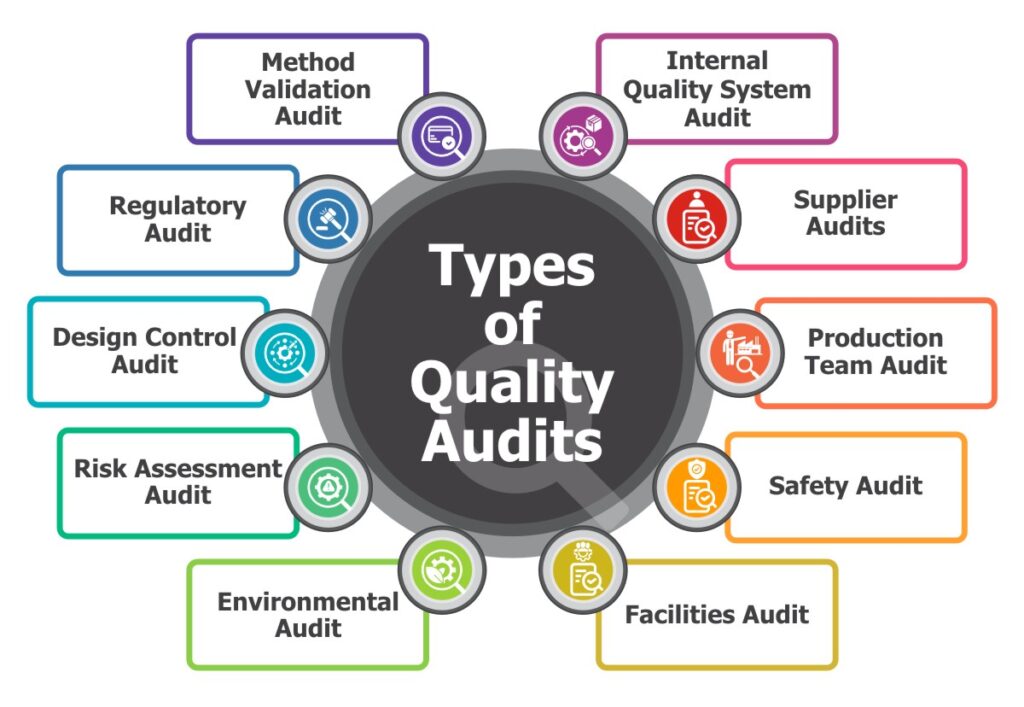Quality audits assesses how well a product, design, process, or system meets specified standards or procedures. The auditors can perform quality audits both within the organization and externally, concentrating on particular processes, products, or systems.
Quality Audits have two Major Components:
- The quality system audit, which evaluates the overall system’s effectiveness, and
- The product or service quality audit, which assesses the products or the services offered
If you are a manufacturing company, seeking to improve your audit process and speed, then this blog is a must-read for you.
Table of Content:
- Overview
- Definition of Quality Audit
- Why Quality Audits are Important?
- Types of Quality Audits
- QualityPro: To Manage all your Audit-related Activities
Overview:
Quality Audit is like having a check-up for the quality of business aspects/entities. For example, Quality Audit in pharma industry is like a check-up for a pharmaceutical company’s quality system, making sure everything is working as per the norms defined by the industry and regulatory bodies.
This check-up is done by an audit team or an auditor. These people can be from inside the company or from third party. They examine and verify procedures, records, and activities to make sure they meet the required standards.
A quality audit is important for ensuring that a company follows the ISO 9001 quality system standard. It is also important to ensure that the company performs the correct operations to maintain good quality practices.
Definition of Quality Audit
A quality audit is a systematic, independent examination and evaluation of processes, products, or systems within an organization to determine their compliance with established quality standards, regulations, and best practices.
In simple words, quality audits assess if systems, processes, machines, and manpower are working well, and if in case of deviations, root causes are identified and fixed promptly.
Why Quality Audits are Important?
Regular quality audits are essential for companies to assess performance and formally document outcomes. Organizations regularly performing internal audits gain substantial benefits, pivotal for optimizing growth. These audits evaluate company efficacy and provide insights for effective strategy alignment.
The insights gained from quality audits can lead to more revenue and numerous benefits. With proper quality audits conducted, companies can:
- Improve the quality of the system as well as the quality of the product
- Assess the cost-effectiveness of quality systems
- Measure the effectiveness of quality tactics
- Increase productivity by making product output more uniform, reducing mistakes, and cutting wastage of resources and manpower
- Give employees the chance to report inadequacies in the interpretation of basic quality requirements.
In addition, quality audits identify the root causes too, so organizations can quickly take corrective action. Process, product, and system audits should be front and center of any quality management strategy.
Types of Quality Audits

The following is a list of commonly performed quality audit types:
Internal Quality System Audit:
Internal Quality System Audit refers to an evaluation conducted within an organization to evaluate and ensure the effectiveness, compliance, and continuous improvement of its internal quality management processes and procedures.
This audit is performed by internal auditors or quality assurance teams to identify areas for enhancement, confirm adherence to established quality standards, and promote overall operational excellence.
The team reviews work instructions to ensure they follow standard procedures and meet quality targets.
Example: The auditors in the company check documents, processes, and employee access to ensure everything is functioning properly.
Supplier Audits:
Supplier audits includes a process of evaluation and collaboration aimed at ensuring both quality and accountability. By comprehensively analyzing multiple factors, companies secure the reliability of their suppliers while holding them responsible for any performance challenges.
The real-time transparency offered by these audits allows businesses and suppliers to jointly monitor purchase order activities and actively address any instances of non-conformities and errors.
For instance, the purchasing team can meticulously review suppliers based on key criteria such as lead time, product quality, cost–effectiveness, and certifications.
Production Team Audit:
Production Audit involves checking the work done by the production team. Companies often audit them for Operator Acceptance or Certified Operator programs, or when they need to requalify their skills.
Auditors review changes to their processes, training records, and past work to ensure everything is up to the required standards.
For example: Auditors check if the team followed procedures, and met quality criteria during pre-qualification.
Safety Audit:
During a Safety Audit, the team checks the plans and procedures in place that keep company employees safe. They review how an equipment is used and cross-check the organization’s safety steps.
The company must implement structured safety policies to prevent accidents and injuries, creating a safer and healthier environment for employees.
For example, a safety auditor can examine how employees use safety gear while operating machinery. Or, how hazardous materials are stored in a company’s warehouse.
Facilities Audit:
Facilities Audit checks the quality of a company’s assets, like buildings and equipment. The auditors should monitor systems like water tankers, ACs, HVAC (heating, ventilation, and air conditioning), manufacturing equipment, technology, etc.
This type of audit focuses on ways to improve safety and quality outcomes.
Example: During a facilities audit, the team inspects the fire extinguishing system to ensure it is approachable and works efficiently, creating a safer workplace for employees.
Environmental Audit:
Environmental audit helps companies make their workplaces greener and less polluted/toxic. It identifies potential risks and creates a plan to meet safety standards like OSHA, cGMP, etc. The audit team checks to see if employees follow these standards and use proper disposal techniques.
For example, the team inspects if hazardous waste are disposed of properly in the prescribed way and proper documents are maintained for it.
Risk Assessment Audit:
Risk Assessment Audit helps companies identify workplace risks. They categorize each risk and put measures in place to prevent accidents, quality issues, machine failures, natural disasters etc.
For example, during the audit, Auditors may identify that the slippery floors in the manufacturing area pose a risk of falls. To prevent accidents, they install non-slip mats and provide safety training to employees. This way, they reduce the chances of workplace injuries and avoid potential financial losses.
Design Control Audit:
Design Control Audit ensures that manufacturers follow a proper, compliant, and systematic method to produce safe and high-quality products that meet user needs.
The audit team solely reviews the design plan, inputs, and outputs to ensure they meet specific criteria and analyze potential risks before they occur.
For example, in the medical device industry, the audit team can check if the design of a new surgical instrument meets the required safety standards. And, if it effectively fulfills the needs of surgeons during procedures. If not, they can take appropriate actions to address and rectify the issues.
Regulatory Audit:
Regulatory Audit checks if a company follows specific rules and standards set by regulatory agencies. They review quality practices and gather crucial data to find grey areas where the company is not following the rules.
For example, the auditors can verify if the aircraft manufacturer complies with FAA (Federal Aviation Administration) regulations to ensure the safety and quality of their aircraft.
Method Validation Audit:
Method Validation Audit is done by regulatory authorities like the FDA to check if the testing methods used in manufacturing are standardized, consistent, and well-documented. It ensures that products made for human use are reliable and accurate.
For example, in pharmaceutical manufacturing, a method validation audit can verify the testing procedures used to check the potency and purity of medicines, making sure it is effective in curing the disease for which it is made.
However, managing all these types of audits together can be a cumbersome task. But, with comprehensive audit management software in place, audits can become as simple as ABC.
It effectively manages all types of quality audits while streamlining the entire audit process. From planning to reporting, the software ensures that the audits conducted are effective, consistent, and accurate.
QualityPro: To Manage all your Audit-related Activities
QualityPro is the next-gen QMS software with a feature-rich audit management solution. It can automate audit tasks, provide a central repository for documentation, enhance communication, track progress, and provide indepth insights.
This audit management software makes audits easier by ensuring they are done consistently, efficiently, and effectively. It automates audit scheduling, generates checklists, stores evidence, creates reports, and tracks corrective actions.
Using this audit management solution, audits occur effortlessly, cover all important areas, keep the proofs safe, share results with management and stakeholders, and implement fixes on time. It simplifies
Key Features of QualityPro: an Audit Management Software can
- Manage and submit quality management system audit checklist
- Define different types of audits and specify whether the audit requires approval or not
- Define different audit categories, like Departmental Audit, Documents Audit, Financial Audit, Organizational Audit, etc.
- Define different audit classes like Internal, External, Remote, etc.
- Manage and store all the points that make up an audit checklist
- Specify the different requirements that make up an audit checklist
- Perform follow up audit to ensure that the corrective actions put in place were effective
- Audit module is connected with CAPA, any NC encountered during Audit can be escalated for root cause analysis and CAPA, and this NC, upon resolution can again be sent for follow up audit ensuring 100% rectification.
To explore more on how it can benefit your organization, feel free to connect our sales team or visit our website!!





